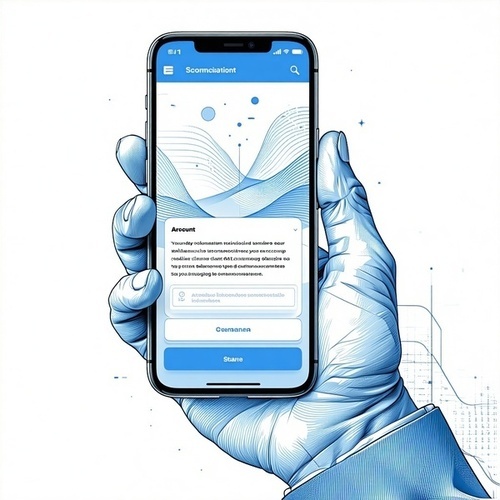Mobile Application Development
Info-Power has over 30 years of business experience and was extending applications to ruggedized handheld devices, like Intermec™ and Symbol™, long before the term "mobile app" became part of everyday language. We've built on that foundation and developed the instinct and know-how to deliver an effective mobile experience with portal support. Additionally, we specialize in taking over projects other people were unable to complete.

Software Application Development Expertise
We specialize in native and hybrid mobile application design and development as well as data architecture. All our programmers are located in the Dallas/Ft. Worth area. This ensures there are no language barriers or international time-zone differences that could complicate your project.
Industries
Info-Power has developed numerous apps for various industries and is always eager to explore new ones.
- Automotive/Trucking
- Healthcare
- Entertainment
- Manufacturing/Industrial

Related Technologies
Info-Power delivers exceptional full-stack solutions, harnessing the latest technologies to create powerful apps for both iOS and Android platforms. Our expertise includes:
Apple Products
For testing and deployment, developers often use iOS devices such as iPhones and iPads to ensure their apps function seamlessly across different hardware. These devices, combined with Apple's development tools like Xcode, enable developers to create, test, and optimize apps efficiently within the Apple ecosystem.
Android Products
Android products used for mobile app development encompass a variety of devices and tools that facilitate the creation, testing, and deployment of Android applications. Developers typically use a range of Android smartphones and tablets, such as Google Pixel devices and other Android-compatible hardware, to test app performance and user experience across different screen sizes and hardware configurations.
Bluetooth Low Energy
Bluetooth Low Energy (BLE) is a wireless communication technology widely used in mobile app development for enabling energy-efficient data exchange between devices. Designed to consume minimal power, BLE is ideal for applications involving wearable devices, Internet of Things (IoT) sensors, and other peripherals that require long battery life. In mobile app development, BLE allows apps to connect seamlessly with nearby devices for functions such as health monitoring, device control, and data transfer, all while maintaining low energy consumption. Its widespread support across smartphones and peripherals makes BLE a crucial technology for creating innovative, connected experiences in mobile applications.
React & React Native
React, developed by Facebook, is a popular JavaScript library primarily used for building user interfaces, especially for web applications. Its versatility extends into mobile app development through React Native, a framework that allows developers to create native mobile apps for iOS and Android using React.
React Native enables the reuse of much of the same codebase across platforms, significantly reducing development time and effort. It provides a rich set of pre-built components and access to native device features, resulting in high-performance, responsive, and visually appealing mobile applications. As a result, React and React Native have become widely adopted tools in the mobile development community, empowering developers to build scalable and maintainable apps with a consistent user experience across different devices.
JavaScript
JavaScript plays a crucial role in mobile app development through frameworks that enable cross-platform creation and access to native features, such as the camera and GPS. It allows developers to build dynamic, feature-rich apps with native-like experiences, including engaging interfaces with animations, real-time updates, and responsiveness.
TypeScript
TypeScript is a smarter way to write mobile app code, building on JavaScript to make development easier and more reliable. It catches errors early, offers helpful features like suggestions, and works seamlessly with tools like React Native and Ionic to create apps for both iPhone and Android. It also keeps code organized and supported by many tools, making app building faster and simpler. Overall, TypeScript helps developers build better, more maintainable mobile apps more efficiently.
Swift
Swift is a powerful and intuitive programming language developed by Apple, designed primarily for iOS, macOS, watchOS, and tvOS app development. Known for its safety features, modern syntax, and high performance, Swift makes coding more accessible and efficient for developers. It emphasizes readability and simplicity, allowing programmers to write clean, maintainable code with fewer errors. Since its introduction in 2014, Swift has gained widespread popularity within the developer community, fostering innovation and enabling the creation of robust, high-quality applications across Apple's ecosystem.
Android Studio
Android Studio is the official integrated development environment (IDE) for building Android applications, developed by Google. It provides a comprehensive set of tools for coding, debugging, testing, and optimizing Android apps, all within a user-friendly interface. Android Studio offers features such as a visual layout editor, code completion, real-time error checking, and an emulator for testing apps across various device configurations. Its robust environment streamlines the development process, enabling developers to create high-quality, performant Android applications efficiently.
Java
Java is a key player in mobile app development, especially within the Android platform. Java is widely utilized for developing backend services that support mobile applications, such as building APIs, managing databases, and handling server-side logic across different mobile platforms. Java's reliability, security capabilities, and scalability make it an excellent choice for building complex, enterprise-level mobile applications, especially those that require integration with existing Java-based systems.
Figma
Figma is a robust online platform mainly used in mobile app development for designing user interfaces and prototypes. It enables real-time collaboration, allowing teams to create and refine designs efficiently. As a central hub for mobile app design, Figma streamlines collaboration, iteration, and smooth handoff between designers and developers.
Claude
The Claude app by Anthropic enables users to create and share AI-driven interactive applications directly within the platform, without coding or deployment. Moving beyond static content, Claude can develop dynamic apps that respond to user input, which can be easily customized and shared, fostering wider collaboration and use. The platform simplifies and lowers the costs of traditional software development.
Firebase
Firebase is a comprehensive platform developed by Google that provides developers with a suite of cloud-based tools for building, managing, and scaling web and mobile applications. It offers features such as real-time databases, user authentication, cloud storage, hosting, and analytics, all designed to simplify backend development and enable rapid app deployment. Firebase's real-time capabilities allow for instant data synchronization across devices, making it ideal for chat apps, collaborative tools, and live updates. Its ease of integration, extensive documentation, and scalable infrastructure have made Firebase a popular choice for developers seeking a reliable, all-in-one backend solution.
Supabase
Supabase is an open-source backend-as-a-service platform that provides developers with a comprehensive suite of tools to build, deploy, and manage modern web and mobile applications quickly and efficiently. Often referred to as an alternative to Firebase, Supabase offers features such as a real-time database built on PostgreSQL, authentication, file storage, and serverless functions, all accessible through a simple and intuitive API. Its emphasis on open-source technology allows for greater customization, transparency, and control over data, making it a popular choice among developers seeking a scalable and flexible backend solution. With its easy setup and robust features, Supabase streamlines the backend development process, enabling teams to focus more on building their application's frontend and user experience.
Flutter
Flutter is an open-source UI software development kit (SDK) created by Google, enabling developers to build natively compiled applications for mobile, web, and desktop from a single codebase. Flutter is widely used because it enables developers to use a single codebase that runs seamlessly on both Android and iOS platforms, significantly reducing development time and effort.
C Sharp
C# is a powerful, object-oriented language within the .NET framework, offering a rich set of features and a vast ecosystem of libraries. It enables developers to build applications that run natively on Android, iOS, Windows, and macOS from a single shared codebase, reducing development time and effort. Additionally, C# and its frameworks provide access to platform-specific APIs, allowing for the integration of native features such as the camera, GPS, and push notifications, for a truly native user experience.
Vercel
Vercel is a cloud platform optimized for frontend development and deployment, known for its seamless integration with frameworks like Next.js. It enables developers to quickly deploy, preview, and scale web applications with minimal configuration, offering features such as automatic SSL, global content delivery, and serverless functions. Vercel's user-friendly interface and efficient workflow streamline the process of building and maintaining high-performance websites, making it a popular choice for developers seeking fast, reliable deployment solutions.

Amazon Web Services
Amazon Web Services (AWS) is a versatile cloud platform offering on-demand resources, including computing, storage, and databases. It enables businesses to develop and operate applications without managing physical infrastructure. With over 200 services, AWS serves millions globally—from startups to large enterprises and government agencies—helping them reduce costs, boost agility, and accelerate innovation through flexible, scalable solutions.
Microsoft Azure
Microsoft Azure helps businesses and mobile app development by providing cloud-based tools and services. It allows companies to build, host, and manage apps and websites without needing their own servers. This enables faster, more flexible, and scalable development—enabling apps to grow easily as more users join. Azure also offers features such as data storage, security, and analytics, helping businesses run smoothly and gain a deeper understanding of their users.
Projects
Due to non-disclosure agreements with our clients and the sensitive nature of some projects, Info-Power has chosen not to disclose the names/business titles of our clients. Here is an overview of the work we did for various customers.
Healthcare:
Client #1 - Info-Power helped to create one of the first HIPAA-compliant messaging apps intended for doctors and first responders in 2012. We wrote native apps for both iOS and Android, as well as the backend code that handled both the message traffic and the system’s integration with the customer’s existing messaging infrastructure.
Client #2 - In 2020, we were asked to review the code for four separate native apps that connected to off-the-shelf BLE sensors to capture medical information. The current apps were floundering, with multiple crash bugs and missing functionality, and the client was trying to decide whether to mothball the project entirely. After providing our recommendations for addressing the necessary fixes, they asked us to take over the development. As part of our efforts, we reduced the number of native apps from four to two React Native ones, with 99% of the codebase shared between the two. We’ve continued to support this customer since, updating and expanding the app’s capabilities multiple times.
Client #3 - The customer needed an MVP in a few weeks for a specialized app intended to prevent mistakes related to the filling of prescriptions by pharmacists, utilizing RFID tags as a safety measure. We provided it in half the time he requested.

Entertainment:
Client #4 - The customer had a specialized entertainment-related app with seasonal content and scheduling capabilities. The previous developer had chosen both backend services and app features that did not scale well as more users were onboarded. We addressed these issues and expanded the app’s capabilities; the app is now one of the top options in its category.
Trucking:
Client #5 - Info-Power developed one of the first commercially available ELDs for the FMCSA’s mandate. We developed solutions for both classic Bluetooth on Android tablets and BLE on iOS, connecting to over a dozen different ECM devices in order to read engine data and transmit it in real-time to tablets in the cabs of long-haul trucks. We also architected and managed the backend that connected both to customer cloud solutions and FMCSA servers, as well as handling compliance with federal regulations.
Why Info-Power?
Trust. Our team's skills encompass a wide range of technology disciplines, ensuring your new application delivers the user experience you envisioned. You will not hear from us - "Well, our app works, but you have a database problem, or a communication problem." When you team with Info-Power, we don't just deliver the app; we help you deliver the experience you had in mind, without the need to engage yet another person or company to complete the project.
